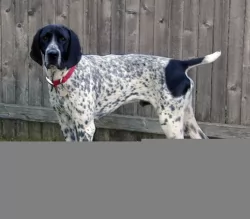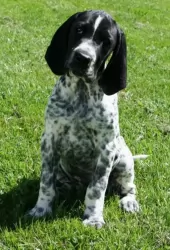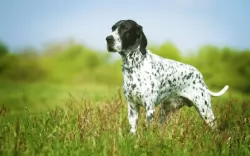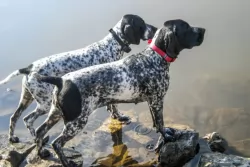 MyDogBreeds
MyDogBreeds King Charles Spaniel is originated from United Kingdom but Braque d'Auvergne is originated from France. King Charles Spaniel may grow 37 cm / 14 inches shorter than Braque d'Auvergne. King Charles Spaniel may weigh 54 kg / 119 pounds lesser than Braque d'Auvergne. Both King Charles Spaniel and Braque d'Auvergne has almost same life span. King Charles Spaniel may have less litter size than Braque d'Auvergne. King Charles Spaniel requires Moderate maintenance. But Braque d'Auvergne requires Low maintenance
King Charles Spaniel is originated from United Kingdom but Braque d'Auvergne is originated from France. King Charles Spaniel may grow 37 cm / 14 inches shorter than Braque d'Auvergne. King Charles Spaniel may weigh 54 kg / 119 pounds lesser than Braque d'Auvergne. Both King Charles Spaniel and Braque d'Auvergne has almost same life span. King Charles Spaniel may have less litter size than Braque d'Auvergne. King Charles Spaniel requires Moderate maintenance. But Braque d'Auvergne requires Low maintenance
 Classified as a toy breed, the King Charles Spaniel is a small, pure breed dog that originated in the United Kingdom. The dog was named after King Charles II of Britain.
Classified as a toy breed, the King Charles Spaniel is a small, pure breed dog that originated in the United Kingdom. The dog was named after King Charles II of Britain.
The dog actually has quite a long, illustrious history. People mistake them for the Cavalier King Charles Spaniel, but they are 2 different breeds, just sharing the same coat colors.The King Charles Spaniel was crossbred with the Pug early in the 19th century to shorten the length of the dog's nose.
With a face similar to that of the Pug, it is thought that these toy spaniels may have originated in the Far East.The earliest recorded pictures of toy spaniels in England were in paintings of Queen Mary 1 and King Philip.
 Sometime over 5 centuries ago, in the Cantal Region of France, was born a hunting breed, that might be the real ancestor of today’s pointing hunter dogs. Perhaps the oldest of all pointing gun dog is the Braque d’Auvergne. This breed comes from Central France in the region of Auvergne. This breed was developed prior to written dog breeding records in order to hunt in this region and find, point, flush out and retrieve fowl. This breed is clearly one of if not the oldest breeds in the French Braque. There is no agreement among historians on what breed is the oldest of the European pointing dogs and where they were developed – was it Spain or was it France? It is thought that the Braque Francais Gascogne is the original one of these in the early 1600’s while the Braque d’Auvergne came soon after. Due to the different hunting needs in the different parts of France, the Braque Francais Gascogne was crossed with a lot of other local scent hounds. The Braque d’Auvergne is one of the very oldest of all of these. There are records of the breeds existence in the 1700’s. It is probable that the Braque d’Auvergne was developed by crossing local dogs with Gascogne as well as with the Petit Bleu de Gascogne and the Grand Bleu de Gascogne.
Sometime over 5 centuries ago, in the Cantal Region of France, was born a hunting breed, that might be the real ancestor of today’s pointing hunter dogs. Perhaps the oldest of all pointing gun dog is the Braque d’Auvergne. This breed comes from Central France in the region of Auvergne. This breed was developed prior to written dog breeding records in order to hunt in this region and find, point, flush out and retrieve fowl. This breed is clearly one of if not the oldest breeds in the French Braque. There is no agreement among historians on what breed is the oldest of the European pointing dogs and where they were developed – was it Spain or was it France? It is thought that the Braque Francais Gascogne is the original one of these in the early 1600’s while the Braque d’Auvergne came soon after. Due to the different hunting needs in the different parts of France, the Braque Francais Gascogne was crossed with a lot of other local scent hounds. The Braque d’Auvergne is one of the very oldest of all of these. There are records of the breeds existence in the 1700’s. It is probable that the Braque d’Auvergne was developed by crossing local dogs with Gascogne as well as with the Petit Bleu de Gascogne and the Grand Bleu de Gascogne.
In all of Western Europe, the region of Auvergne is not very populated and has unique geography in that is hilly and has many extinct and eroded volcanoes. A lot of the region is still unpopulated. In this environment, wildlife has flourished, and hunting is successful in providing food for the regions people. This circumstance with an abundance of birds, led to the breeding of the Braque Auvergne to specialize in hunting in this area. The breed is not very popular outside of Auvergne and probably never was. That fact allowed them to be devastated by the Second World War. The Reunion des Amateurs de Braque d’Auvergne (RABA) was started to promote the pure breeding and the protection of the d’Auvergnes. But when Auvergnes was occupied during the war, the slowed breeding of the Braque d ‘ Auvergne almost eliminated the breed. There might have only been about 25 dogs left following the end of the war. These remaining dogs were used to revive the breed, but it is still uncommon, but not rare. Individuals have been imported by other countries including North America. The United Kennel Club (UKC) accepted the breed in 2006 but is not accepted by the AKC (American Kennel Club). The breed is still a working breed and outside of France, very rare.
 The King Charles Spaniel is a medium sized dog that stands at roughly 23 – 28cm and weighs anything from 3 to 8kg. He is smaller than the Cavalier King Charles.
The King Charles Spaniel is a medium sized dog that stands at roughly 23 – 28cm and weighs anything from 3 to 8kg. He is smaller than the Cavalier King Charles.
He has a long coat which can be white, black and tan or a reddish-brown color. He has a domed head with a short, turned up nose and 'squashed' face similar to the pug. The eyes are large and dark and also protruding. The ears are set low and are long and floppy and the tail, once docked, is now left long and feathery.
Friendly, while being somewhat reserved, the King Charles Spaniel is looked upon as a lap dog as he loves to spend time indoors with his human family.
He isn't particularly energetic, but will still need some exercise like ball games and going on a walk. With training and socialization he becomes quiet and obedient and is known as a popular therapy dog. They are kind and loving with kids and pets in the home.
 The Braque d’Auvergne is a well built, strong hunting dog with long ears, a large head and a docked tail. His coat is white with black markings and black ears and head. The breed looks a lot like all the other pointing dogs from France. They are medium in stature and has the appearance of a working gundog. He is athletic, muscular and fit. Docking the tail is outlawed in many countries and all of the United Kingdom. In that case the tail is high on the rump and always straight. Their face and head are big for the size of the body and shaped like an oval. With a long muzzle, deep set eyes and a gentle expression, they are kindly and handsome dogs. Their skin is loose but not droopy or wrinkled like hound dogs.
The Braque d’Auvergne is a well built, strong hunting dog with long ears, a large head and a docked tail. His coat is white with black markings and black ears and head. The breed looks a lot like all the other pointing dogs from France. They are medium in stature and has the appearance of a working gundog. He is athletic, muscular and fit. Docking the tail is outlawed in many countries and all of the United Kingdom. In that case the tail is high on the rump and always straight. Their face and head are big for the size of the body and shaped like an oval. With a long muzzle, deep set eyes and a gentle expression, they are kindly and handsome dogs. Their skin is loose but not droopy or wrinkled like hound dogs.
 Your King Charles Spaniel is such a joy to have in the home and because he is intelligent he will easily learn some simple commands too.
Your King Charles Spaniel is such a joy to have in the home and because he is intelligent he will easily learn some simple commands too.
He wants to please you and be with you wherever you go. He is a social dog and thrives on your attention, and if you open your home and your heart to this sweet dog, you’re going to have a devoted, loving, loyal friend beside you every day.
 This is a gentle, adaptable and obedient breed. With their intelligence and affectionate nature, they make great family dogs and are eager to please their people. Living with other dogs is fine but not with small, prey size animals. The Braque d’Auvergne should never be left alone pets like gerbils and hamsters. They must be socialized to cats as pets and not prey before living with them successfully. They need to work closely with one human partner. They are first and foremost a hunting dog and need some sort of hunting simulation. They are devoted to their families and want to be constantly in their presence. This can lead to separation anxiety if they are left alone too much. They are great with children and need a family.
This is a gentle, adaptable and obedient breed. With their intelligence and affectionate nature, they make great family dogs and are eager to please their people. Living with other dogs is fine but not with small, prey size animals. The Braque d’Auvergne should never be left alone pets like gerbils and hamsters. They must be socialized to cats as pets and not prey before living with them successfully. They need to work closely with one human partner. They are first and foremost a hunting dog and need some sort of hunting simulation. They are devoted to their families and want to be constantly in their presence. This can lead to separation anxiety if they are left alone too much. They are great with children and need a family.
 The eye problems that you might need to know about with a King Charles Spaniel are entropian, cataracts and corneal dystrophy.
The eye problems that you might need to know about with a King Charles Spaniel are entropian, cataracts and corneal dystrophy.
Heart conditions could include mitral valve disease where the blood flows backwards through the chambers of the heart, leading to congestive heart failure.
The King Charles Spaniel is a brachycephalic breed and these dogs can have upper airway problems. Breathing difficulties can also occur because of an abnormally small windpipe which is a characteristic common to brachycephalic breeds. You may notice rapid breathing with your dog , snoring, frequent panting, coughing and difficulty with swallowing.
As a dog owner, you have a responsibility to your pet. He will need to visit the veterinarian for all his puppy vaccinations as well as other vaccinations as an adult dog. He will also need to be de-wormed.
If you don’t want him or her becoming a parent, make sure your pet is neutered or spayed. If your pet is showing signs of an illness that he doesn’t get over quickly, get him immediately to the vet.
 The Braque d’Auvergne is a healthy breed but can face some of the same health concerns as other pointers and hunting dogs. The long, droopy ears can get infected easily if wet and need to be cleaned regularly so that food or dirt are not trapped their either. Because of the small gene pool however they may be at risk for several issues. The breeders in France express concerns about possible hip dysplasia and testing is highly recommended. Because they are at risk for other conditions that might not show up until later in life, it is also recommended that they be tested by the Canine Eye Registration Foundation (CERF) as well as the Orthopedic Foundation for Animals (OFA).
The Braque d’Auvergne is a healthy breed but can face some of the same health concerns as other pointers and hunting dogs. The long, droopy ears can get infected easily if wet and need to be cleaned regularly so that food or dirt are not trapped their either. Because of the small gene pool however they may be at risk for several issues. The breeders in France express concerns about possible hip dysplasia and testing is highly recommended. Because they are at risk for other conditions that might not show up until later in life, it is also recommended that they be tested by the Canine Eye Registration Foundation (CERF) as well as the Orthopedic Foundation for Animals (OFA).
 Your King Charles Spaniel has a long, silky coat that will require brushing twice a week to control shedding and keep his coat free of matting.
Your King Charles Spaniel has a long, silky coat that will require brushing twice a week to control shedding and keep his coat free of matting.
His nails will also require regular trimming to ensure they don’t hook on anything. His long ears are also prone to ear infection, so be sure to check them inside and out for ticks and fleas and to also remove excess wax and dirt.
Teeth should also be regularly brushed with canine toothbrush and toothpaste.
Be sure to keep your King Charles Spaniel content and healthy by ensuring he goes on a long walk and that you play with him to build a strong bond between you and to ensure he doesn’t become bored.
Excellent, quality food is important for your spaniel. The best dog food manufacturers have age- and breed-specific formulas and there is the perfect one for your King Charles Spaniel. Homemade food is also excellent for this dog and you can add some cooked chicken, brown rice and vegetables into his kibble as a nutritious treat.
Make sure your spaniel has a warm, dry, peaceful place to sleep and wash the bedding regularly to keep him healthy and happy.
Ensure he always has a cool, fresh bowl of drinking water nearby.
 The Braque d’Auvergne needs a high-quality diet fit for a working dog but not too much to make him obese. They are an active breed to choose a formula that is designed for working dogs.
The Braque d’Auvergne needs a high-quality diet fit for a working dog but not too much to make him obese. They are an active breed to choose a formula that is designed for working dogs.
Although no studies have been conducted on the Braque d’Auvergne’s health issues there are many conditions that similar breeds are susceptible to and the d’Auvergne might be as well. This includes any of the following:
This is an active, working dog who needs a lot of stimulation and exercise. The only real appropriate exercise for these dogs is hunting or outings in the woods. He not only needs the exercise, but he also needs to stimulate his sense of smell and his gundog intelligence. He might excel in lure chase or even a form or barn hunt. They certainly could excel at obedience trials and perhaps rally. If you are a weekend hunter then this is the ideal dog for you. They are so easy to train that they surpass other pointers for success with casual hunters. They hunt at a slower pace than many other gundogs. Their intelligence and athleticism lend itself well to agility and flyball also. They need a large (+acres)fenced in area to run and play.